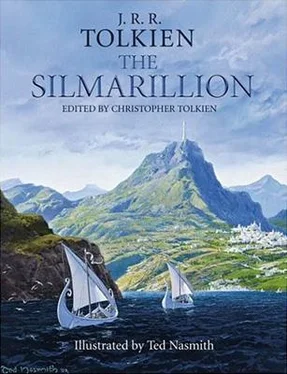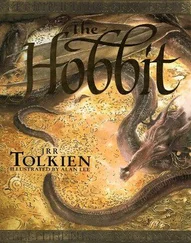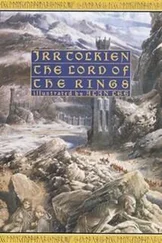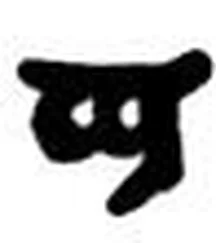lóm 'echo' in Dor-lómin, Ered Lómin; related are Lammoth, Lanthir Lamath.
lómë 'dusk' in Lómion, lómelindi; see dú.
londë 'land-locked haven' in Alqualondë; the Sindarin form lond ( lonn ) in Mithlond.
los 'snow' in Oiolossë (Quenya oio 'ever' and losse 'snow, snow-white'); Sindarin loss in Amon Uilos and Aeglos.
loth 'flower' in Lothlórien, Nimloth; Quenya lótë in Ninquelótë, Vingilótë.
luin 'blue' in Ered Luin, Helluin, Luinil, Mindolluin.
maeg 'sharp, piercing' (Quenya maika) in Maeglin.
mal- 'gold' in Malduin, Malinalda; also in mallorn, and in the Field of Cormallen, which means 'golden circle' and was named from the culumalda trees that grew there (see cul -).
mān- 'good, blessed, unmarred' in Aman, Manwë; derivatives of Aman in Amandil, Araman, Úmanyar.
mel- 'love' in Melian (from Melyanna 'dear gift'); this stem is seen also in the Sindarin word mellon 'friend' in the inscription on the West-gate of Moria.
men 'way' in Númen, Hyarmen, Rómen, Formen.
menel 'the heavens' in Meneldil, Menelmacar, Meneltarma.
mereth 'feast' in Mereth Aderthad; also in Merethrond, the Hall of Feasts in Minas Tirith.
minas 'tower' in Annúminas, Minas Anor, Minas Tirith, etc. The same stem. occurs in other words referring to isolated, prominent, things, e.g. Mindolluin, Mindon; probably related is Quenya minya 'first' (cf. Tar-Minyatur, the name of Elros as first King of Númenor).
mîr 'jewel' (Quenya mîrë) in Elemmírë, Gwaith-i-Mírdain, Míriel, Nauglamír, Tar-Atanamir.
mith 'grey' in Mithlond, Mithrandir, Mithrim; also hi Mitheithel, the river Hoarwell in Eriador.
mor 'dark' in Mordor, Morgoth, Moria, Moriquendi, Mormegil, Morwen, etc.
moth 'dusk' in Nan Elmoth.
nan(d) 'valley' in Nan Dungortheb, Nan Elmoth, Nan Tathren.
nár 'fire' in Narsil, Narya; present also in the original forms of Aegnor (Aikanáro 'Sharp Flame' or 'Fell Fire') and Fëanor (Feanaro 'Spirit of Fire'). The Sindarin form was naur, as in Sammath Naur, the Chambers of Fire in Orodruin. Derived from the same ancient root (a)nar was the name of the Sun, Quenya Anar (also in Anárion), Sindarin Anor (cf. Minas Anor, Anorien ) .
naug 'dwarf' in Naugrim; see also Nogrod in entry groth. Related is another Sindarin word for 'dwarf', nogoth, plural noegyth ( Noegyth Nibin 'Petty-dwarves') and nogothrim.
-(n)dil is a very frequent ending of personal names, Amandil, Eärendil (shortened Eärnil ) , Elendil, Mardil, etc.; it implies 'devotion', 'disinterested love' (see Mardil in entry bar ) .
-{n)dur in names such as Eärendur (shortened Eärnur ) is similar in meaning to - (n)dil.
neldor 'beech' in Neldoreth; but it seems that this was properly the name of Hírilorn, the great beech-tree with three trunks ( nelde 'three' and orn ) .
nen 'water', used of lakes, pools, and lesser rivers, in Nen Girith, Nenning, Nenuial, Nenya; Cuiviénen, Uinen; also in many names in The Lord of the Rings, as Nen Hithoel, Bruinen, Emyn Arnen, Núrnen. Nîn 'wet' in Loeg Ningloron; also in Nindalf.
nim 'white' (from earlier nimf, nimp ) in Nimbrethil, Nimloth, Nimphelos, niphredil ( niphred 'pallor'), Barad Nimras, Ered Nimrais. The Quenya form was ninque; thus Ninquelótë=Nimloth. Cf. also Taniquetil.
orn 'tree' in Celeborn, Hírilorn; cf. Fangorn 'Treebeard' and mallorn, plural mellyrn, the trees of Lothlórien.
orod 'mountain' in Orodruin, Thangorodrim; Orocarni, Oromet. Plural ered in Ered Engrin, Ered Lindon, etc.
os(t) 'fortress' in Angrenost, Belegost, Formenos, Fornost, Mandos, Nargothrond (from Narog-ost-rond ) , Os(t)giliaih, Ost-in-Edhil.
palan (Quenya) 'far and wide' in Palantíri, Tar-Palantir.
pel- 'go round, encircle' in Pelargir, Pelóri, and in the Pelennor, the 'fenced land' of Minas Tirith; also in Ephel Brandir, Ephel Dúath (ephel from et-pel 'outer fence').
quen- (quet-) 'say, speak' in Quendi ( Calaquendi, Laiquendi, Moriquendi ) , Quenya, Valaquenta, Quenta Silmarillion. The Sindarin forms have p (or b ) for qu; e.g. pedo 'speak' in the inscription on the West-gate of Moria, corresponding to the Quenya stem quet; and Gandalf's words before the gate, lasto beth lammen 'listen to the words of my tongue', where beth 'word' corresponds to Quenya quetta.
ram 'wall' (Quenya ramba) in Andram, Ramdal; also in Rammas Echor, the wall about the Pelennor Fields at Minas Tirith.
ran- 'wander, stray' in Rána, the Moon, and in Mithrandir, Aerandir; also in the river Gilraen in Gondor.
rant 'course' in the river-names Adurant (with adu 'double') and Celebrant ('Silverlode').
ras 'horn' in Barad Nimras, also in Caradhras ('Redhorn') and Methedras ('Last Peak') in the Misty Mountains; plural rais in Ered Nimrais.
rauko 'demon' in Valaraukar; Sindarin raug, rog in Balrog.
ril 'brilliance' in Idril, Silmaril; also in Anduril (the sword of Aragorn) and in mithril (Moria-silver). Idril's name in Quenya form was Itarillë (or Itarildë ) , from a stem ita- 'sparkle'.
rim 'great number, host' (Quenya rimbл ) was commonly used to form collective plurals, as Golodhrim, Mithrim (see the Index), Naugrim, Thangorodrim, etc.
ring 'cold, chill' in Ringil, Ringwil, Himring; also in the river Ringló in Gondor, and in Ringarë, Quenya name of the last month of the year ( The Lord of the Rings Appendix D).
ris 'cleave' appears to have blended with the stem kris- of similar meaning (a derivative of the root kir- 'cleave, cut', q.v.); hence Angrist (also Orcrist 'Orc-cleaver', the sword of Thorin Oakenshield), Crissaegrim, Imladris.
roch 'horse' (Quenya rokko ) in Rochallor, Rohan (from Rochand 'land of horses'), Rohirrim; also in Roheryn 'horse of the lady' (cf. heru ) , Aragorn's horse, which was so called because given to him by Arwen ( The Return of the King V 2).
rom- A stem used of the sound of trumpets and horns which appears in Oromë and Valaróma; cf. Béma, the name of this Vala in the language of Rohan as translated into Anglo-Saxon in The Lord of the Rings Appendix A (II): Anglo-Saxon bēme 'trumpet'.
Читать дальше










